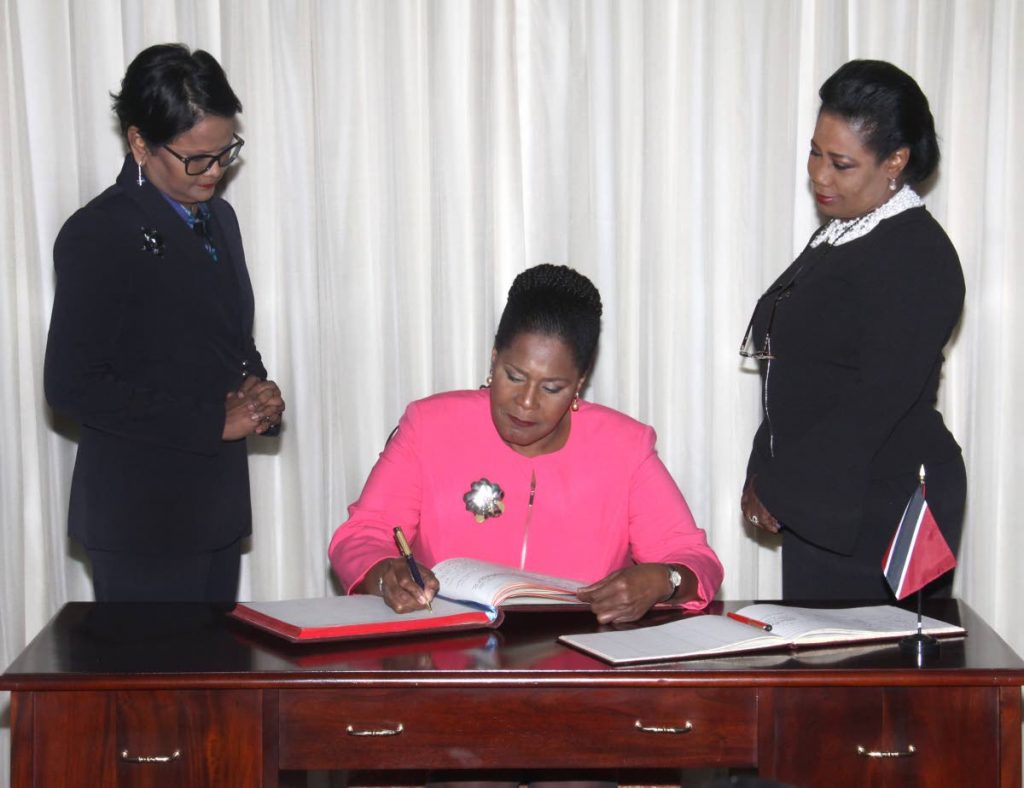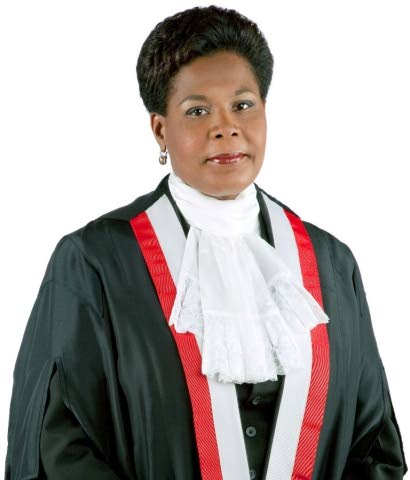‘My life no longer my own’

The following is the conclusion of Newsday editor-in-chief Judy Raymond’s interview with President-elect Paula-Mae Weekes which was conducted on Monday at the Parliament Tower, International Waterfront Centre in Port of Spain.
From her predecessors’ examples, Paula-Mae Weekes has learned that being President is “a very hard job. You have to be on top of the law as it applies in any given situation. You will bear the overall responsibility for any errors. You need to be exceedingly careful and have oversight of what’s going on under your watch. Your life is no longer yours.”
She’s enjoyed her freedom until now, giving as an example: “to put on my short pants at a whim and go to the grocery.” She doesn’t agree, however, that her previous life, as a judge, was secluded. “You do your work in the public gaze,” she points out. “You go to the grocery, to church...”
The latter is important to her. As Chancellor of the Anglican Church since 1997, she has acted as its legal adviser, head of the laity and sat on various committees, from which she will resign later this month. There’s been more to her life than work and church.
She loves to travel: “India, the Far East, Kenya – twice, South Africa, Tanzania – once I put God out of my thoughts and tried to climb Mt Kilimanjaro, but I got very bad altitude illness; Dubai. I’m very frequently in the US: I spend Easter in New York with a small girls’ lime, a friend from Vancouver and one from Barbados.”
It’s not all glamorous and high-flying. She cooks, “not often, but well, if I may say so myself…though I can’t bake to save my life.” She used to run with the Bad Mind Crew, including four marathons, but now her limit is a “semi-brisk” walk – starting back that habit was her New Year’s resolution – and she goes to the gym.
PAULA-MAE:
PANWOMAN
She’s an early bird, starting work at 2 or 3 am, and getting up by 4.30 am on other days, so it remains to be seen how she’ll cope with evening functions. On stepping down from the Bench, too, she began reading some of her many books, having “bought novels compulsively” for years, but she doubts she’ll have much time for that while she is President.
Asked about the general perception of her, she laughs, promising a few surprises, because so far people have only seen one side of her. “More will unfold as time goes on.” She offers some revelations: she was a tenor bass player for Power Stars in three Panoramas, as well as being in the crowd at the Grand Stand in other years; played the recorder on Twelve and Under and in the Music Festival; and has played mas several times. She may not do cocktail parties, but she used to fete at PSA and Customs.
“Oh yes,” she announces, somewhat startlingly, “I was a Soca Village queen in my time.” Is there anything she isn’t good at? “Singing. And I can’t play anything involving a ball. I’m dismal at tennis. And golf – oh no, please!” She says there are other things, but you’d have to ask.
After leaving the Bench she joined Facebook, where she has posted uncontroversial links that include one by Michelle Obama on not revealing “every thought” on social media – advice she has clearly taken to heart. Sometimes she’s been more playful, putting up a meme that reads: “I like to have my cake and eat it too. I’d also like to have your cake and eat it too.” She added breezily, “What more can I say?”
On a video of American astrophysicist and broadcaster Neil de Grasse Tyson criticising “fuzzy thinking,” she enthused, “OMG! This is brilliant.”
EXPECT NOFAVOURS
One imagines Paula-Mae Weekes regarding fuzzy thinking with withering scorn. Her Facebook profile picture is a cartoon of a judge looking exasperated, on which a friend commented, “The patented Weekes eye roll.” One experienced attorney who appeared before her recalled, “No one could make you feel like a blithering idiot like Justice Weekes.” Sometimes she would slice and dice an inept lawyer so subtly they wouldn’t even realise it until long after. And mangling the English language before Weekes JA was a suicidal move.
Asked if there’s anything specific she would like to tell people, she immediately switches into judge mode, snapping out the words with precision: “I’m surprised that people who should know better have applied to me for favours. I would like them to desist. That will save them some embarrassment. I’ve never done it, and I’m not going to start now.”
She gives some unexpected answers when asked who her heroes are. The least unpredictable one is the writer CS Lewis; she read the Narnia books as a child, of course, then later came to his work on faith (Lewis converted to Anglicanism at 32). She admires not only his “wonderful” writing but his contemplative approach to life and reality, “the way he fitted his life into his religion in a practical way.”
ADMIRER OF THE
‘SMALL PEOPLE’
But she also speaks of “the small people,” singling out a woman she considers “wonderful,” always cheerful despite physical challenges, from Massy Stores in Diego Martin, “who’s been a mother to the young ladies who have passed through the store”; and a taxi driver who became a friend when she worked in the DPP’s office and travelled to San Fernando in his car.
She doesn’t give his name, because he would find that “awfully embarrassing,” but admires him because: “He’s a hard worker; all his children all got a formal – and informal – education up to tertiary level. He continues to work hard: he gets up at 3 to come to Port of Spain. “Many Trinidadians see these people, but don’t talk about it. They are the salt of the earth, battling with the hands they’ve been dealt.”
These are the people for whom she wants to be President.
She understands it will be difficult, for reasons of time and security and other commitments, just to get out and about and meet people like this. Nevertheless, contradicting the perception of her aloofness, Paula-Mae Weekes wants “to be as accessible as practical in all of the circumstances. Maintaining a real contact with the population is important.”


Comments
"‘My life no longer my own’"